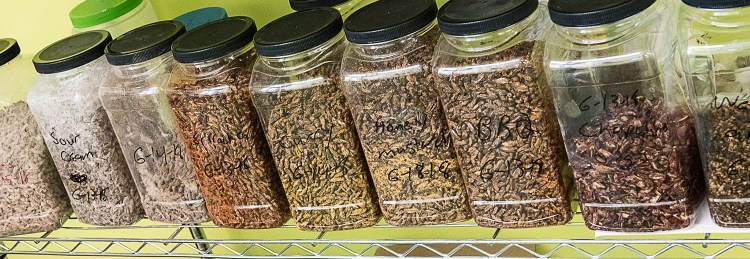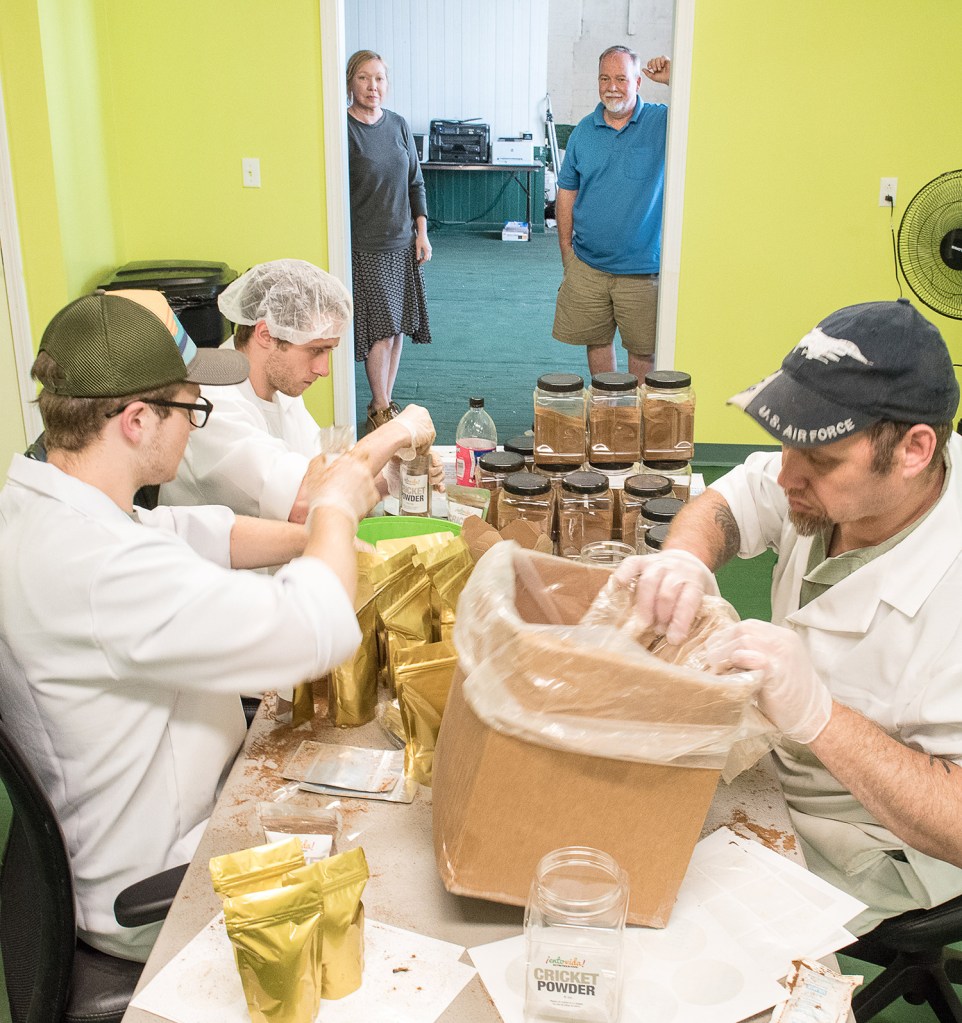LEWISTON — Brother and sister Bill and Susan Broadbent have moved their edible insect business from his 600-square-foot barn in Auburn into 5,000 square feet in Lewiston’s Hill Mill so they can expand their product line – cotton candy crickets are coming in two weeks – and raise first thousands, then a million, crickets per month.
The siblings also hired their first six employees, who started work this week, and they’re pitching major health food and grocery chains to get on those shelves.
Business is, no question, hopping.
“They call crickets the gateway bug,” Bill Broadbent said.
The Broadbents founded Entosense LLC three years ago and, from their website EdibleInsects.com, already offer 130 products using 30 to 40 insects, including Manchurian scorpions, giant June bugs, housefly eggs and gourmet black ants.
They sell to shops, restaurants and customers who’ve embraced the unusual-by-American-standards way to get more protein in their diets.
“The hardest bug to eat is your first one,” Broadbent quipped.
In recent years, insects have crept into pop culture on shows such as “Bizarre Foods with Andrew Zimmern” and “Top Chef Masters.” In 2017, the Seattle Mariners baseball team began selling four-ounce cups of chapulines – toasted, marinated grasshoppers – at the ballpark and brought them back this year because of their popularity.
The ballpark concession stand that serves them has its own source in Mexico, but last year when they had a run and couldn’t keep up with demand, they reached out to the Broadbents.
“The funny thing is, when they called looking for more, they said, ‘Do you guys have chapulines?’ I said, ‘Well, we used to have 60 or 80 pounds about a week ago but you guys went public and now we’re out, too,” Bill Broadbent said.
Entosense’s plans call for setting up a commercial kitchen for roasting on the fifth floor of the Hill Mill. They’ve already set up a clean room and offices and have space to grow the cricket farm where they hope to be raising up to a million crickets per month in a year’s time
In making the move across the river, the company can grow from buying product in small packages that they affix their own label to, to buying in bulk and repackaging, a move that’s cost-effective and lets them experiment with wilder flavors.
Coming soon are roasted crickets in flavors including white cheddar, orange creamsicle, Mexican mole, Italian lasagna, Korean barbecue, jalapeno garlic and cotton candy, “which tastes surprisingly good,” Bill Broadbent said. “(Susan) did a lot of taste-testing to come up with those.”
Within the month, they also hope to have a small test farm set up.
“One of the things we want to experiment with is, if we raise the crickets on mint, will they be minty?” he said. “If they eat chili, will they end up being chili (flavored), spicy? Because insects are, basically, what they eat. What if you raise crickets on carrots, will they be higher in vitamin A?”
Eventually, they’d like to grow the cricket farm to between 10,000 and 20,000 square feet.
“One of the keys here is we’re using this space to show what we can do per square foot,” Broadbent said. “There’s a big demand right now and it both comes from the food industry and from the medicinal, pharmaceutical companies. We feel like we’re still in the infancy. It’s just going to keep growing.”
They also have long-term plans for a local retail location.
Cricket powder, 60 percent protein by volume, can be turned into “almost anything and it has a very mild taste,” he said. “Most people don’t even notice. They’re more bio-available than most protein sources, meaning that your body absorbs more protein per gram than you would with regular meat.
“Environmentally, there’s a ton of reasons: They’re sustainable, they can be grown in an urban environment, they use a fraction of a percent of water that cattle or other animals do, their food-to-feed ratio is two to one, which is great.”
With an ever-growing population and fewer resources, they’re hoping more people reconsider the edible bug.
“Three years ago, everybody thought we were just trying to gross people out,” Susan Broadbent said. “They didn’t know about any of the health aspects or the environmental aspects, and now with all the shows, we contact a lot of people by phone and they’ve heard of (eating insects).”
Kathryn Skelton can be contacted at:
kskelton@sunjournal.com
Send questions/comments to the editors.




Success. Please wait for the page to reload. If the page does not reload within 5 seconds, please refresh the page.
Enter your email and password to access comments.
Hi, to comment on stories you must . This profile is in addition to your subscription and website login.
Already have a commenting profile? .
Invalid username/password.
Please check your email to confirm and complete your registration.
Only subscribers are eligible to post comments. Please subscribe or login first for digital access. Here’s why.
Use the form below to reset your password. When you've submitted your account email, we will send an email with a reset code.